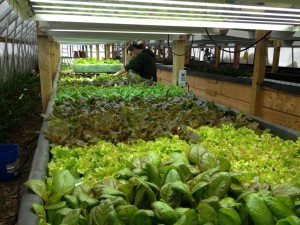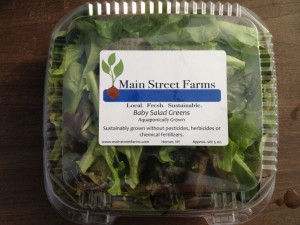Trainee Spotlight: Allan Gandelman and Main Street Farms
by Amy Cheatle
March, 2013
Allan Gandelman and farming partner Bob Cat greet visitors to their Homer, NY farm wearing huge grins. Their project, Main Street Farms, located between Syracuse and Ithaca, is a small but successful study in greenhouse aquaponics. Made possible in part by the programs of the Groundswell Center, it’s recent success is making these gentlemen smile.
 Inside the largest greenhouse on the one-acre property, life is flourishing. Hot rays of sun stream in and support stacked rows of green, red and purple edibles. Underneath the two tiers of plants, 9,000 tilapia fish peacefully live in tanks, their waste feeding the roots of the floating plants above. The operation runs year-round, providing wholesale and private customers with fish and greens weekly, even during the cold winter months. Lately, Gandelman says they can barely keep up the orders for their greens, and demand is only growing.
Inside the largest greenhouse on the one-acre property, life is flourishing. Hot rays of sun stream in and support stacked rows of green, red and purple edibles. Underneath the two tiers of plants, 9,000 tilapia fish peacefully live in tanks, their waste feeding the roots of the floating plants above. The operation runs year-round, providing wholesale and private customers with fish and greens weekly, even during the cold winter months. Lately, Gandelman says they can barely keep up the orders for their greens, and demand is only growing.The inspiration for farming came gradually to Gandelman, who earned degrees in geography, anthropology and secondary education before teaching middle and high school social studies in upstate New York. A desire to grow food and to feed others called Gandelman from the classroom to the land, but not before he spent months traveling the globe and living in India.
In 2010, after returning to the states, Allan completed the Groundswell New Farmer Training Program and the Sustainable Farming Certificate Program. He then founded Main Street Farms and began raising aquaponic greens. After a year of successfully growing and selling his organic produce, he incorporated aquaculture into his process and began farming antibiotic and hormone free tilapia. Bob joined the farm after completing the Sustainable Farming Certificate with The Groundswell Center as well.
 Allan and Bob Cat credit Groundswell for guiding them towards a successful enterprise. Says Gandelman, “…with Groundswell, you’re getting the best farmers in the area to open up their farms, their business plans, their marketing strategies, growing practices and maybe most importantly, their lifestyles”. The business classes he took through Groundswell allowed them to bring “…spreadsheets filled with numbers” into funding meetings and for use in competitive grant applications. The program provided them entry into a rich network of food producers, and allowed them to become beacons for other individuals interested in sustainable aquaponics. Gandelman notes that visitors come to learn from their farm from all over the country, and that a good deal of his work week is spent educating others who are interested in the practice.
Allan and Bob Cat credit Groundswell for guiding them towards a successful enterprise. Says Gandelman, “…with Groundswell, you’re getting the best farmers in the area to open up their farms, their business plans, their marketing strategies, growing practices and maybe most importantly, their lifestyles”. The business classes he took through Groundswell allowed them to bring “…spreadsheets filled with numbers” into funding meetings and for use in competitive grant applications. The program provided them entry into a rich network of food producers, and allowed them to become beacons for other individuals interested in sustainable aquaponics. Gandelman notes that visitors come to learn from their farm from all over the country, and that a good deal of his work week is spent educating others who are interested in the practice.This year Main Street Farms was awarded an S.A.R.E Grant to research farming Black Soldier Fly larvae for use as fish food. The fly larvae would be raised on cafeteria waste from the local middle school adjacent to the farm property, allowing the school to reduce it’s total garbage footprint while providing the farm with much-needed compostables. If successful, the project would enable Allan to come closer to achieving a sustainable, closed loop system of aquaculture. As part of the grant dictates sharing findings with other area farmers, Gandelman again looks to the Groundswell network as a tool to connect with the region’s network of food producers.
The future of Main Street Farms will incorporate new growth. Allan and Bob will be building a new high-tunnel this spring on the property to raise tomatoes, eggplants and peppers. Gandelman has recently acquired an empty two acre lot in the city of Cortland which will be turned into a traditional urban farm which will utilize the latest is season extension practices. And if he comes across a problem during his period of expansion, he can look to Groundswell for guidance, support, information, connections and encouragement.
To learn more about Main Street Farms visit their website atwww.mainstreetfarms.com or join them on Facebook and stay up-to-date on farm happenings.
